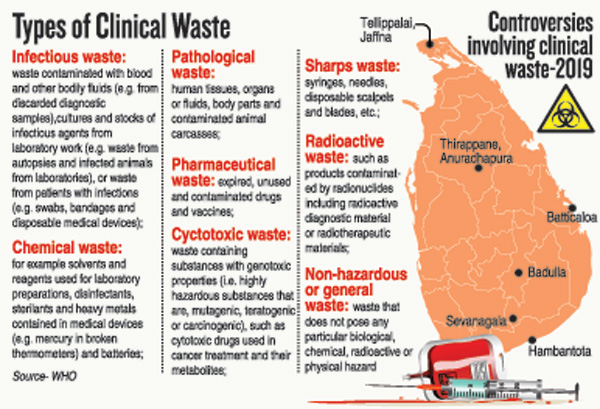News
Big stink over improper disposal of clinical waste
Questions are being raised over the disposal of clinical waste from healthcare facilities following the recent detection that such waste has been dumped illegally and haphazardly in various parts of the country.
The latest incident was reported on Friday when the authorities found a stock of clinical waste buried inside a Mahaweli Reserve at Ketanwewa in Hambantota. A container suspected to have been used by the racketeers to transport the clinical waste was also found at the location. The Hambantota Pradeshiya Sabha, Hambantota Police and Mahaweli officials are probing the incident.
Meanwhile, investigations are also ongoing over the dumping of clinical waste in the Samagipura area at Sevanagala in the Monaragala District. The suspects involved in the racket had allegedly dug up the clinical waste, which had been buried by them in the location, and were attempting to transport it to another location when they were met by angry area residents.
Faced with the protests, two of the four tipper trucks that were transporting the waste had turned back while the other two were subsequently taken to the Sevanagala Police Station along with their contents. The other two vehicles are yet to be traced. The Central Environmental Authority (CEA) will file legal action tomorrow against those involved in the racket.
CEA’s Chemicals and Hazardous Waste Management Unit Director Ajith Weerasundara told the Sunday Times there are strict regulations regarding the collection, transport and handling of clinical waste. “You need a CEA issued licence to collect, transport, store and dispose hazardous waste of this nature. Those involved in the Sevanagala incident had no such licence. We are probing how they collected the clinical waste,” he said.
Mr Weeasundara said legal action would be taken under the National Environment Act against those who had buried the clinical waste. If any hospital officials had illegally given clinical waste to those who did not have licences to will also be charged in court, he warned.
The Sunday Times learns that some contractors who have legally obtained permission to collect clinical waste sometimes hire unlicensed subcontractors to do their work. This appears to be the case in last month’s incident at Thirappane in Anuradhapura. On that occasion, area residents stopped a container that was transporting clinical waste allegedly to be dumped at an abandoned gravel pit.
Though the suspects initially claimed that the clinical waste came from the Colombo National Hospital, a search of the container revealed that it was from the Kurunegala Teaching Hospital. Thirappane Police arrested the container driver, its owner and the subcontractor and produced them in the Anuradhapura Magistrate’s Court. The suspects were released on bail while the court also ordered them to hand over the clinical waste to the Aruwakkalu waste management facility and produce a receipt.
Kurunegala Teaching Hospital Director A.M.S. Weerabandara confirmed that the clinical waste found in Thirappane came from his hospital.
“The contractor told us that the clinical waste was being taken for storage when the container had been stopped by villagers. We can’t verify his story so we cancelled the tender and awarded it to a new party,” he said.
A clinical waste issue has also affected the Badulla General Hospital where stocks of cytotoxic waste (waste generated from cytotoxic therapy given to cancer patients) have been stored in a Sathosa storage facility coming under the hospital. Hospital Director Upul Karunaratne refuted allegations that the waste was being stored in a haphazard manner. He said the waste had been collecting at the hospital for the past three and a half years as the private company tasked with removing it had refused to collect it owing to a payment issue. “We, however, believe the matter will be resolved within a week,” he remarked.
Sisili Hanaro Encare (Pvt.) Ltd, the company contracted to remove waste from the Western, Southern and Central Provinces, disputed the Badulla Hospital Director’s claim that the company was at fault for allowing the waste to accumulate. “They haven’t paid us for more than three years.
The last payment was on July 5, 2016. How can we collect the waste under such circumstances?” asked the company’s chairman Udaya Abeysekera. He said the hospital had now agreed to pay the company after the Badulla Hospital’s issue was highlighted in the media.
Health Services Director General Anil Jasinghe said clinical waste management was being done in terms of two arrangements. One is the tripartite agreement the Health Ministry has signed with the CEA and Sisili Hanaro Encare to collect and dispose of clinical waste from government healthcare facilities in the Western, Southern and Central Provinces. The other arrangement is through an Australian-funded project where the clinical waste from other provinces is collected and shredded to pieces (metermised) to ensure high volume reduction.
Dr Jasinghe said the original idea was for the local authorities to take on the shredded clinical waste and dispose of them as waste since the waste in this form did not pose much environmental or health risk. However, some local councils have not been supportive of the project and have refused to accept any clinical waste even in the shredded form. Therefore, hospitals, which do not have incinerators, have to rely on CEA-approved private contractors to dispose of the clinical waste.
The Health Services DG said he would not rule out the possibility that much of the clinical waste being found dumped in recent times had come from private hospitals. “Many of them don’t have proper clinical waste disposal methods. Of course, even the Government system is not foolproof as we have more than 1200 healthcare institutions.”
Dr Jasinghe said the best solution was to ensure that whatever waste generated in a particular district was managed within that district.
| Wheels within wheels: Racket exposed | |
| In January, 2014, Sisili Hanaro Encare (Pvt.) Ltd. began collecting clinical waste from Government healthcare facilities in the Western, Southern and Central Provinces after signing a tripartite agreement with the Ministry of Health (MoH) and the Central Environmental Authority (CEA). The pilot project was for five years. In December last year, the company signed a new 10-year tripartite agreement with the MoH and the CEA.  Udaya Abeysekera At present, the company processes up to eight metric tonnes of clinical waste a day at its incinerator in Muthurajawela. The incinerator can heat up to 1000-1200 degrees Celsius and completely burn the clinical waste. Sisili Projects Consortium (Pvt.) Ltd chairman Udaya Abeysekera said that after an Initial Environment Examination (IEE), the project was approved by the Cabinet and other authorities, including the CEA, the MoH, the Ministry of Environment and local authorities. The monitoring by the CEA and the MoH of the facility continues on a monthly basis, he explained, adding that the company had plans to instal another incinerator at the site by the end of the year. The two incinerators would then be able to handle about 16 metric tonnes of clinical waste. The company is paid Rs. 67 for every kilogram of clinical waste. The amount is paid on the understanding that the waste is incinerated. However, Mr Abeysekera said contractors who did not have such facilities have also been collecting clinical waste. “They have no incinerators. So, they go and dump it somewhere else. Some dump it on lands while others mix it with general waste and dump it at garbage dump sites. This means they only have to bear the transport cost, resulting in huge profits for them.” Mr Abeysekera questioned as to how such racketeers can collect clinical waste from Government hospitals without having any of the required approvals. “Lots of money change hands for them to cover their tracks. That is how the racket operates. There are wheels within wheels,” |
| Court order ends Batticaloa’s medical waste crisis | |
| A clinical waste controversy that has plagued the Batticaloa Teaching Hospital for the past eight months appeared to have ended on Friday after the hospital authorities obtained a court ruling to dispose of the waste in a safe manner. Hospital Director Kalaranjani Ganesharaja told the Sunday Times the court ruled in the hospital’s favour, allowing them to dispose of the clinical waste by burying it in a deep pit at a state land at Veppaveduval in Karadiyanaru. More than seven metric tonnes of clinical waste had accumulated at the hospital for the past eight months owing to regular protests from some groups led by area politicians, Dr Ganesharaja said. She said the hospital had first tried to dispose of the waste at a site allocated to it by the Health Ministry. The site located at Thraimadu in Batticaloa had an incinerator. However, protests by villagers forced the authorities to abandon the attempt. They then tried to dispose of it at a place in Karadiyanaru only to be met by further protests. As a result, the garbage trucks with clinical waste had to be parked outside the Batticaloa Teaching Hospital for two days. When the dispute was taken to the Batticaloa Magistrate’s Court, the magistrate on Friday gave an order prohibiting people from obstructing the transport and disposal of the clinical waste at the site in Karadiyanaru. |

